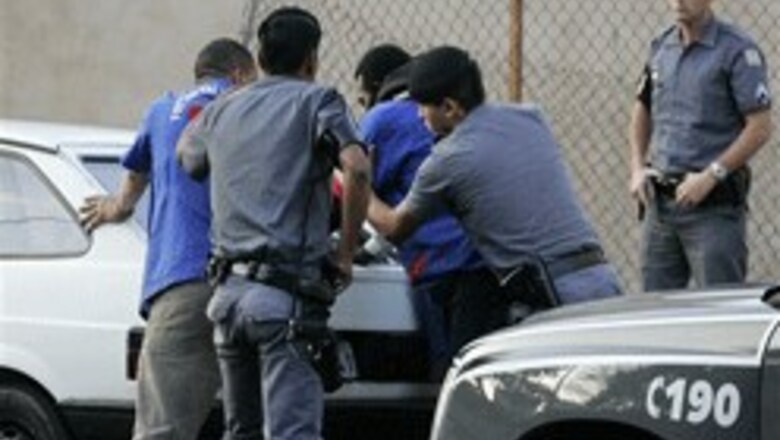
views
Sao Paulo: A notorious criminal gang unleashed a second wave of attacks against the police, bringing the number of people killed to 52,of which 36 were policemen, eight bystanders, and six suspects.
At least 100 separate attacks took place on Friday, Saturday and Sunday,said the Sao Paulo state government.
On Sunday, dozens of new prison rebellions also broke out, with 41 uprisings under way across Sao Paulo state in the afternoon. Inmates were holding more than 229 prison guards hostage.
Late Sunday evening, the Folha de Sao Paulo newspaper's website reported that the death toll had risen to 55 and that at least 10 public buses had been burnt down.
Enio Lucciola, spokesman for the Sao Paulo State Public Safety Department, said the attacks and prison rebellions, planned by the First Capital Command, known by its Portuguese initials PCC, ''were the most vicious and deadliest attacks on public security forces that have ever taken place in Brazil.''
The rebellious inmates, however, have not made any demands nor have they harmed any of their hostages, said Jorge de Souza, a press spokesman of the Sao Paulo Prison Affairs Department.
He said visiting relatives were inside several of the prisons but that ''we don't consider them hostages because they are there to show solidarity with their jailed relatives. They don't want to leave.''
For Walter Fanganiello Maierovitch, an expert on organized crime and Brazil's former drug czar, the PCC resorted to ''terrorist tactics,'' launching attacks that were reminiscent of the violence seen daily in Baghdad.
The attacks were in response to the transfer of several imprisoned PCC leaders, a practice authorities use to sever prisoners' ties to gang members outside prison.
Eight PCC leaders were among 765 inmates transferred to a remote, high-security facility in the far western tip of Sao Paulo state.
PAGE_BREAK
Lucciola said authorities were prepared for some kind of PCC attack once the transfer of its leaders became known.
''But we never imagined it would be so big or ferocious,'' he said. ''It caught us by surprise.''
The PCC was founded in 1993 by hardened criminals at the Taubate Penitentiary in Sao Paulo but remained a relatively obscure group until February 2001, when it organized the biggest prison uprising in Brazil's history.
At least 72 suspects, ''all of them with long criminal records,'' have been arrested, Lucciola said.
Authorities said police units were on maximum alert, and the federal government said it was ready to help the state with all means available.
Officers in bulletproof vests set up checkpoints to search vehicles, and barriers were placed in front of many police stations to keep pedestrians and vehicles away.
Assailants also attacked patrol cars, bars where off-duty policemen gather, a courthouse and a highway police outpost on the outskirts of the city of Sao Paulo.
Local media reported that the assailants used guns, shotguns, grenades, machine guns and homemade bombs in the attacks in Sao Paulo city and its suburbs; coastal cities like Santos, Guaruja and Cubatao; and cities more than 300 kilometers (185 miles) away.
On Sunday morning, policemen were notably absent on Avenida Paulista, one of Sao Paulo's most important thoroughfares.
''We can't let this pass,'' Nilo Faria Hellmeister, a police officer and friend of Martinez, told the news service. ''We must adopt an incisive and extremely harsh attitude.''
In Brazil, the fire department is part of the State Police and firefighters are also police officers.




















Comments
0 comment